Sleep Apnea Treatment Dallas
Enjoy Sweeter Sleep
Do you always feel tired despite your efforts to get 7 – 8 hours of sleep each night? Does your partner complain that you snore? You might have a condition known as sleep apnea, a dangerous disorder that can threaten your health and negatively affect your quality of life. The good news is that our Dallas dental team provides effective sleep apnea treatment in the form of oral appliance therapy.
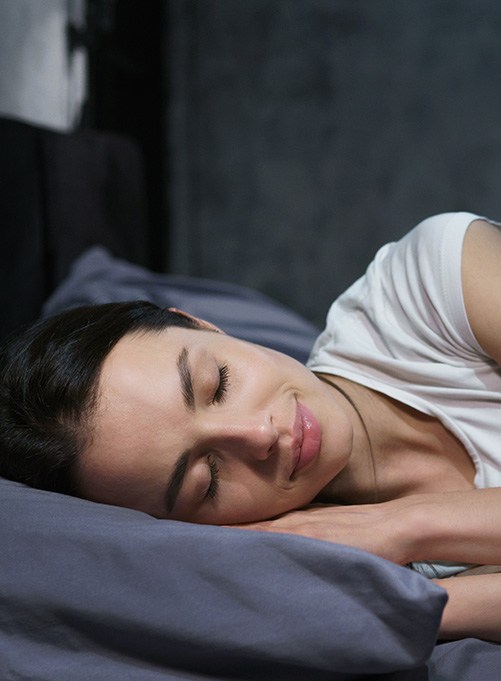
Why Choose Dental Center of Lakewood for Sleep Apnea Treatment?
- Popular & Effective CPAP Alternative
- Custom-Made Devices for Each Patient
- Lower Your Risk of Health Problems
What Is Sleep Apnea?
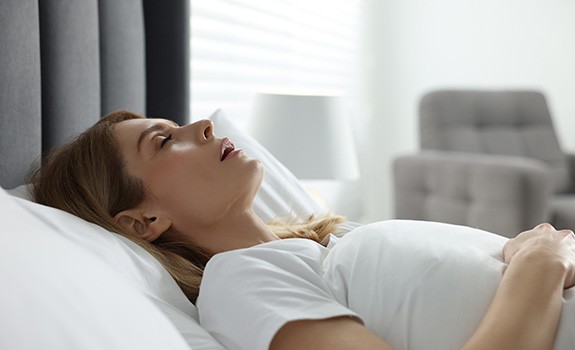
Sleep apnea is a condition characterized by repeated pauses in breathing during sleep. These episodes, known as apneas, can occur dozens or even hundreds of times in a single night. They disrupt the sleep cycle and can make it impossible to benefit fully from your nightly shuteye.
There are different types of sleep apnea. The most common variety, obstructive sleep apnea (OSA), happens when tissues in the throat over-relax and block the airway. Many people with OSA snore loudly and frequently. Daytime fatigue, morning headaches and sore throats, and moodiness are other common symptoms.
The other types of sleep apnea are:
- Central sleep apnea (CSA), which occurs when the brain does not issue proper breathing signals.
- Mixed or combined sleep apnea, which has characteristics of both OSA and CSA.
The Dangers of Sleep Apnea

Too many people dismiss sleep apnea as a mere nuisance, but the reality is that it can have serious consequences!
- Physical Health Problems: You may experience a higher risk of developing serious conditions, such as high blood pressure, heart disease, stroke, and diabetes. This is because untreated sleep apnea places extra strain on your cardiovascular system and affects your body's ability to regulate blood sugar levels.
- Mental Health Problems: You could face mood disturbances, difficulty concentrating, memory troubles, and increased feelings of anxiety or depression. These issues can occur because poor sleep disrupts your brain's ability to function optimally, influencing both your emotional stability and cognitive abilities.
- Increased Risk of Accidents: You are more likely to suffer from daytime fatigue, which impairs your alertness and reaction time. This makes you vulnerable to accidents at work, while driving, or during routine activities.
Sleep Apnea Treatment Options
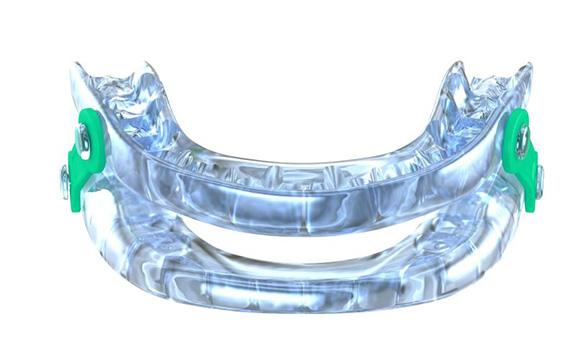
CPAP therapy is the most common treatment for OSA. It involves the use of a machine that uses pressurized air to prevent airway collapse. Unfortunately, many people find their CPAP machine to be uncomfortable and inconvenient. This treatment option has a relatively low compliance rate.
Oral appliance therapy is a popular alternative. Our team can provide a custom device, which resembles a mouthguard. Its purpose is to move the jaw slightly forward during sleep, in turn keeping the airway open and reducing or potentially eliminating breathing disruptions. Many people agree that an oral appliance is more comfortable and easier to use than a CPAP.
Have you been diagnosed with sleep apnea? Our team would be happy to help you understand your treatment options. Get in touch with us today!
Understanding the Cost of Sleep Apnea Treatment
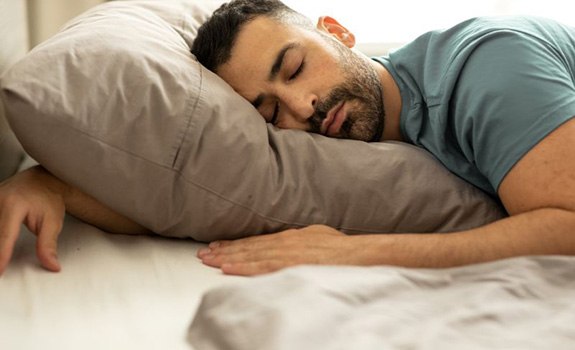
The cost of sleep apnea treatment depends on a few factors. After we learn about your case, we will decide which type of appliance is right for you, and we can discuss the cost of your care. Most people find that their treatment is surprisingly affordable, especially when they take advantage of available provisions, such as insurance and financing. Remember, improving the quality of your sleep is an investment in your health and overall quality of life!
Does Dental Insurance Cover the Cost of Sleep Apnea Treatment?

We are a dental practice, so you might naturally wonder if your dental insurance will help pay for your sleep apnea treatment. The answer is likely no. That is because, even though dentists often help patients with sleep apnea, it is more often considered a medical condition than an oral health condition. Therefore, your health insurance is much more likely to provide coverage than your dental plan.
Factors That Affect the Cost of Sleep Apnea Treatment
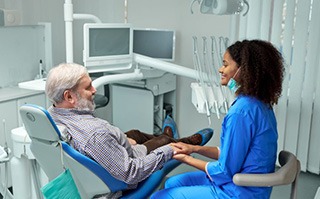
Two main factors that can influence the cost of your sleep apnea treatment include:
- Insurance coverage. Most health insurance plans cover sleep apnea testing and many common treatments, including oral appliance therapy. Our team will be happy to help you file claims with your insurance so you can receive proper reimbursement for the cost of your appliance.
- The type of treatment you receive. Oral appliance therapy and CPAP are the two most common treatments for sleep apnea. Their cost can depend on the type of treatment you receive, as well as the specific device you use to reduce your symptoms.
Treat Your Sleep Apnea Now to Improve Your Health

As a frugal individual, you might hesitate to invest in sleep apnea treatment. After all, you might be used to feeling tired! However, it is important to consider how much is at stake. If you consistently fail to get an adequate amount of high-quality sleep, your health could be seriously affected. You may be at a greater risk of:
- Heart attack
- Stroke
- High blood pressure
- Dementia
- Metabolic syndrome
- Type 2 diabetes
- Depression
- Dangerous accidents
- And more!
Such problems can be expensive to manage, and they can even be life-threatening! Since sleep apnea treatment can reduce your risk of these issues, you can rightly view it as a smart investment in your future.
Making Sleep Apnea Treatment More Affordable

Outside of insurance, another provision that might make it easier to afford your sleep apnea treatment is financing. Our practice works with CareCredit, a third-party lending company, to provide low-interest payment plans. The application process is fast, and most patients are quickly approved for credit.
Sleep Apnea FAQs
Can I Diagnose Sleep Apnea on My Own?
While some signs of sleep apnea are easy to notice, especially loud snoring or gasping during sleep, you can’t accurately diagnose the condition on your own. Sleep apnea can only be confirmed through a professional sleep study that measures breathing, oxygen levels, and brain activity overnight.
It’s important to get a formal diagnosis because there are different types of sleep apnea, each requiring its own form of treatment. Obstructive sleep apnea is the most common kind and one that an oral appliance could treat. However, there is also the potential for either central or complex sleep apnea, which would require a different approach.
Will Oral Appliance Therapy Make CPAP Therapy Unnecessary?
For many patients with mild to moderate sleep apnea, oral appliances can be an effective alternative to CPAP, especially when it comes to compliance. Only about half of the patients who receive a CPAP machine actually use it because of its bulk and noise.
Contrast this with an oral appliance that gently repositions your jaw, keeping your airway open during sleep. They’re small, portable, and much quieter than a CPAP machine, making them easier to use consistently.
All that said, some patients with severe sleep apnea may still need CPAP or combination treatment. During your consultation, our team will evaluate your case and recommend a solution that fits your needs.
Will My Sleep Apnea Go Away If I Lose Weight?
Weight loss can often improve sleep apnea symptoms, especially if there’s excess tissue around your throat that’s contributing to airway blockage. However, weight isn’t the only factor to consider when it comes to relief from sleep apnea.
Many people with these conditions are not overweight, and factors like jaw position, nasal structure, or enlarged tonsils could just as easily be contributing factors to airway obstruction.
At the Dental Center of Lakewood, we recommend using an oral appliance while working on lifestyle changes. Combining both approaches can maximize results and reduce long-term health risks linked to untreated sleep apnea.
How Soon After Starting Sleep Apnea Treatment Will I Notice Improvement?
Most patients notice positive changes within the first few nights of wearing their oral appliance. You may wake up feeling more refreshed, experience fewer morning headaches, and find that your mood and focus improve throughout the day.
However, not everyone experiences the results so immediately. For some, it may take a few weeks to fully adjust and feel the benefits. Our Dallas dental team will check your progress, make adjustments as needed, and ensure your oral appliance fits well, so you can achieve restful, consistent sleep.
